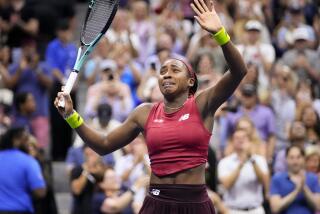Destiny Sides With Davenport in the U.S. Open
- Share via
NEW YORK — The tears belonged to the winner this time, as potential and destiny finally came together for 22-year-old Lindsay Davenport.
Dealing with questions about her potential was a simpler task, handled long ago. Destiny was a far more difficult opponent at the U.S. Open on Saturday.
The first time Davenport thought about her destiny was in the seventh game of the second set against defending champion and top-seeded Martina Hingis of Switzerland. She was leading, 4-2, two games away from her first Grand Slam title.
“Yeah, then I got broken and then it was 4-4,” she said of losing her serve and the next game as well. “That went out the window so fast. I thought, ‘My gosh, I might win this.’ ”
The old Davenport would have sagged. The new Davenport stayed resolute and aimed for the lines, beating Hingis, 6-3, 7-5, in the final. In seven matches, the second-seeded Davenport did not drop a set.
And the ending was a perfect punctuation to the final. After a long rally, Hingis hit a drop shot. Davenport ran it down and smacked a cross-court backhand winner.
“Two years ago, I’ll be perfectly honest, she could not have done that,” said her mother, Ann Davenport.
The popular victory unleashed a torrent of tears. Lindsay Davenport, a sweet and sensitive soul, wept and was choked up during her brief victory speech. Ann Davenport cried upon receiving the ultimate birthday present from her daughter. Even USTA President Harry Marmion shed some tears.
One of the things worrying Davenport before the final was the speech, not Hingis’ ground strokes. “I woke up once in the middle of the night and it took me a while to fall back asleep,” she said. “I thought about what I would say in my speech I couldn’t make [today].”
And the best thing about Davenport is that she didn’t need a Grand Slam title to feel complete after she had come close, having reached three Grand Slam semifinals before this U.S. Open.
“I always said that if I never won one, I’d still be a great person and still like myself,” she said. “And I’d still keep on playing tennis. For my career, I feel like it’s a great, great script.”
Still, Davenport, who lives in Newport Beach, had plenty of support. Her first coach from her days as a youngster in the South Bay, Robert Lansdorp, took a red-eye flight from Los Angeles to be on hand.
Amid all the emotion, her current coach, Robert Van’t Hof, remained calm. “I’m not that emotional, I’m more realistic,” he said.
Support came from Mary Joe Fernandez and mentor Billie Jean King. Fernandez reached the Australian Open final in 1990 and 1992.
“Luckily, I was able to get it back together,” Davenport said. “You might not ever get an opportunity to be back here. I talked to Mary Joe this morning.
“She was great. She told me, ‘I always thought I’d be back there a million times, and I never did. You’ve got to take advantage of this one and win it.’
“[Billie Jean King] was great. She gave me a long speech before the Olympics [in 1996], the finals. Today, she just kind of winked, ‘You know what to do. I don’t need to talk to you anymore.’ ”
Hingis, who reached her first Grand Slam final since winning the Australian Open in January, noticed Davenport’s different attitude earlier in the summer. In August, she lost to Davenport in the final at Manhattan Beach, also, coincidentally, trying a drop shot on match point.
“When you saw her before, she was kind of--after you’d break her, just make a good point--she would let herself go down,” Hingis said. “She would show it. That’s the difference.”
Davenport was relatively calm considering it was her first Grand Slam final. She faltered momentarily in the second set--dealing with destiny--but got on track when she won eight of nine points in one stretch.
“I hate to tell you, but I was always the one who went behind her saying, ‘Come on,’ ” Ann Davenport said, of urging her daughter to stand tall. “I was the one that always put my knuckle on the back, ‘You are what you are. You can’t help that you are tall.’ ”
Finally, Davenport was standing tall on the day she became the first American-born woman to win the U.S. Open since Chris Evert did in 1982. Her mother’s words after all these years were so true.
More to Read
Go beyond the scoreboard
Get the latest on L.A.'s teams in the daily Sports Report newsletter.
You may occasionally receive promotional content from the Los Angeles Times.











